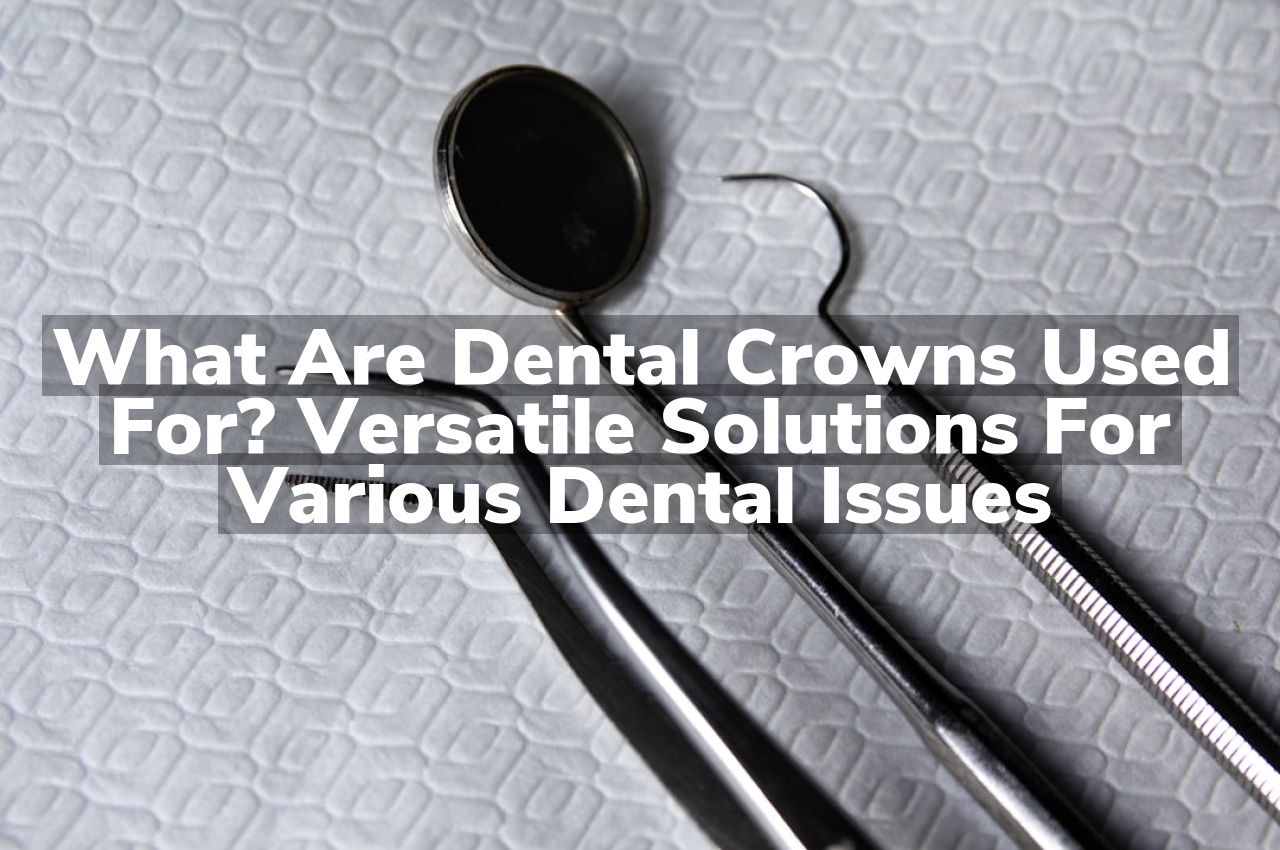What are dental crowns used for, and how do they offer versatile solutions for various dental issues? Dental crowns are used to restore the function and appearance of damaged or decayed teeth, providing a protective cover that helps maintain oral health. They are commonly utilized in procedures to strengthen teeth and support dental bridges, addressing a wide range of dental concerns.
Typical Lifespan of Dental Crowns
Dental crowns use extends beyond just improving the appearance of teeth; they also provide a protective cover, restoring functionality and strength to damaged teeth. Generally, the lifespan of dental crowns can vary widely depending on several factors including the material used, the placement in the mouth, and the care they receive. While they are designed for long-term use, most crowns last between 5 to 15 years before they might need replacement. For those looking to understand more about how these restorations work and their benefits, What Are Dental Crowns? Understanding Their Role in Modern Dentistry offers a comprehensive overview. It’s important to recognize that the longevity of dental crowns also hinges on individual habits and oral hygiene practices. Regular dental check-ups are crucial in ensuring that your crowns maintain their function and aesthetic over time.
Impact of Material on Durability
The durability of dental crowns is significantly influenced by the materials from which they are made. Common materials include porcelain, ceramic, gold, and metal alloys, each offering different levels of strength and wear resistance. Porcelain and ceramic crowns are popular for their aesthetic appeal as they closely mimic the natural color of teeth. However, gold and metal alloys are often chosen for their superior durability and strength, especially in restoring molars which endure the brunt of chewing forces. Different materials not only affect the longevity of dental crowns but also their functionality and compatibility with natural teeth. While all materials are designed to protect and restore the tooth, the choice of material can impact the crown’s ability to withstand daily dental stresses such as biting and grinding. For more detailed information on options available, consider visiting Custom Dental Crowns in Meridian.
Signs of Crown Loosening or Shift
Recognizing the signs of crown loosening or shift is crucial for individuals with dental crowns. Common indicators include a noticeable movement or wiggle of the crown, a change in bite alignment, or an unusual sensation when chewing or biting. Additionally, sensitivity to hot or cold temperatures and discomfort around the crown area might also suggest that the crown is not securely fitted. These signs could be indicative of an underlying issue with the dental crown’s placement or integrity.
Symptoms of Underlying Decay
Identifying the symptoms of underlying decay early can be crucial for maintaining oral health. Common signs include persistent toothache, sensitivity to hot and cold temperatures, visible holes or pits in your teeth, and black, white, or brown staining on any surface of a tooth. Swollen and tender gums can also indicate decay, especially if they bleed easily when you brush or floss. Bad breath or a bad taste that won’t go away can also be a subtle sign of decay lurking beneath the surface. These symptoms might suggest the need for dental crowns among other dental care considerations. For more information, consider visiting Alliance Dental Care, your trusted Meridian Dentist.
Crown Cracking or Chipping Indicators
When it comes to maintaining your dental crowns, it’s crucial to be aware of the signs that may indicate they need attention. One common issue is the loosening of the crown, which can compromise its effectiveness and comfort. Symptoms of loose dental crowns include noticeable movement or shifting of the crown when you chew or speak, a clicking sound, or a sudden sensitivity to hot and cold temperatures. Additionally, if you start feeling pain or discomfort around the crowned tooth, it could be a sign that the crown is not fitting as snugly as it should. Regular check-ups with your dentist are essential to ensure your dental crowths remain in optimal condition and to address any issues before they require more significant interventions.
Gum Health and Crown Stability
Maintaining gum health and ensuring crown stability are crucial aspects of the effectiveness of dental crowns use. Dental crowns not only restore the appearance and function of damaged teeth but also play a significant role in protecting vulnerable areas from further decay and supporting overall oral health. Properly fitted crowns help distribute the stress of biting and chewing evenly, which aids in preserving the underlying bone structure and gum health. This stability is essential for preventing gum disease and ensuring that the crown remains securely in place, offering a long-term solution for various dental issues.
Regular Check-Ups and Crown Assessment
Regular dental check-ups are crucial for maintaining the longevity and effectiveness of dental crowns. During these visits, your dentist will assess the condition of your crowns to ensure they are still functioning properly and haven’t been compromised. This is essential because the durability and success of dental crowns use depend significantly on their maintenance. These assessments help in identifying any potential issues such as crown loosening, decay under the crown, or gum disease around the crown area early, allowing for timely interventions that can prolong the life of your crowns and maintain overall oral health.
Effects of Bite and Alignment
Dental crowns play a crucial role in correcting bite and alignment issues, which are essential for both oral health and overall well-being. Misaligned teeth can lead to uneven force distribution when chewing, which might cause jaw pain, headaches, and even wear down your teeth prematurely. By using dental crowns, dentists can reshape the teeth to ensure proper alignment and a more balanced bite. This not only improves the functionality of your teeth but also prevents future dental complications. The strategic dental crowns use in these scenarios showcases their versatility and effectiveness in providing a comprehensive solution for various dental issues.
When to Consult Your Dentist
If you’re experiencing dental discomfort, noticeable tooth decay, or have a cracked or broken tooth, it might be time to consult your dentist about the potential for dental crowns use. Dental crowns are versatile solutions that can restore the functionality and appearance of your teeth, protecting them from further damage. Whether you’ve had a root canal treatment, a large filling, or are seeking to improve the aesthetic of misshapen or discolored teeth, discussing dental crowns with your dentist can provide you with a tailored solution to enhance your oral health and smile.
Conclusion
For more insights on dental crowns use, explore reviews on Google Maps. If you have further questions, call us at 208-646-9461 .




